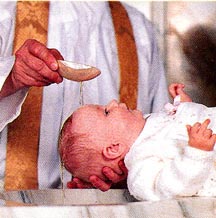"Christian, recognize your dignity and, now that you share in God's own nature, do not return to your former base condition by sinning. Remember who is your head and of whose body you are a member. Never forget that you have been rescued from the power of darkness and brought into the light of the Kingdom of God." (St. Leo the Great)
The Symbol of the faith confesses the greatness of God's gifts to man in his work of creation, and even more in redemption and sanctification. What faith confesses, the sacraments communicate: by the sacraments of rebirth, Christians have become "children of God," (Jn. 1:12; 1 Jn. 3:1) "partakers of the divine nature." (2 Pt. 1:4) Coming to see in the faith their new dignity, Christians are called to lead henceforth a life "worthy of the gospel of Christ." (Phil. 1:27) They are made capable of doing so by the grace of Christ and the gifts of his Spirit, which they receive through the sacraments and through prayer.
Christ Jesus always did what was pleasing to the Father, (cf. Jn. 8:29) and always lived in perfect communion with him. Likewise Christ's disciples are invited to live in the sight of the Father "who sees in secret,"(Mt. 6:6) in order to become "perfect as your heavenly Father is perfect."(Mt. 5:48)
Incorporated into Christ by Baptism, Christians are "dead to sin and alive to God in Christ Jesus" and so participate in the life of the Risen Lord. (Rm. 6:11 and cf. 6:5; cf. Col. 2:12) Following Christ and united with him, (cf. Jn. 15:5) Christians can strive to be "imitators of God as beloved children, and walk in love"(Eph. 5:1-2) by conforming their thoughts, words and actions to the "mind . . . which is yours in Christ Jesus,"(Phil. 2:12) and by following his example. (cf. Jn. 13:12-16)
"Justified in the name of the Lord Jesus Christ and in the Spirit of our God,"(1 Cor. 6:11) "sanctified . . . (and) called to be saints,"(1 Cor. 1:2) Christians have become the temple of the Holy Spirit. (cf. 1 Cor. 6:19) This "Spirit of the Son" teaches them to pray to the Father (cf. Gal. 4:6) and, having become their life, prompts them to act so as to bear "the fruit of the Spirit" (Gal. 5:22,25) by charity in action. Healing the wounds of sin, the Holy Spirit renews us interiorly through a spiritual transformation. (cf. Eph. 4:23) He enlightens and strengthens us to live as "children of light" through "all that is good and right and true." (Eph. 5:8-9)
The way of Christ "leads to life"; a contrary way "leads to destruction."(Mt. 7:13; cf. Dt. 30:15-20) The Gospel parable of the two ways remains ever present in the catechesis of the Church; it shows the importance of moral decisions for our salvation: "There are two ways, the one of life, the other of death; but between the two, there is a great difference."(Didache 1,1)
“I ask you to consider that our Lord Jesus Christ is your true head, and that you are one of his members. He belongs to you as the head belongs to its members; all that is his is yours: his spirit, his heart, his body and soul, and all his faculties. You must make use of all these as of your own, to serve, praise, love, and glorify God. You belong to him, as members belong to their head. and so he longs for you to use all that is in you, as if it were his own, for the service and glory of the Father.” (St. John Eudes)
“For to me, to live is Christ.” (Phil. 1:21)
FROM the Catechism of the Catholic Church, 1691-1696,1698


No comments:
Post a Comment